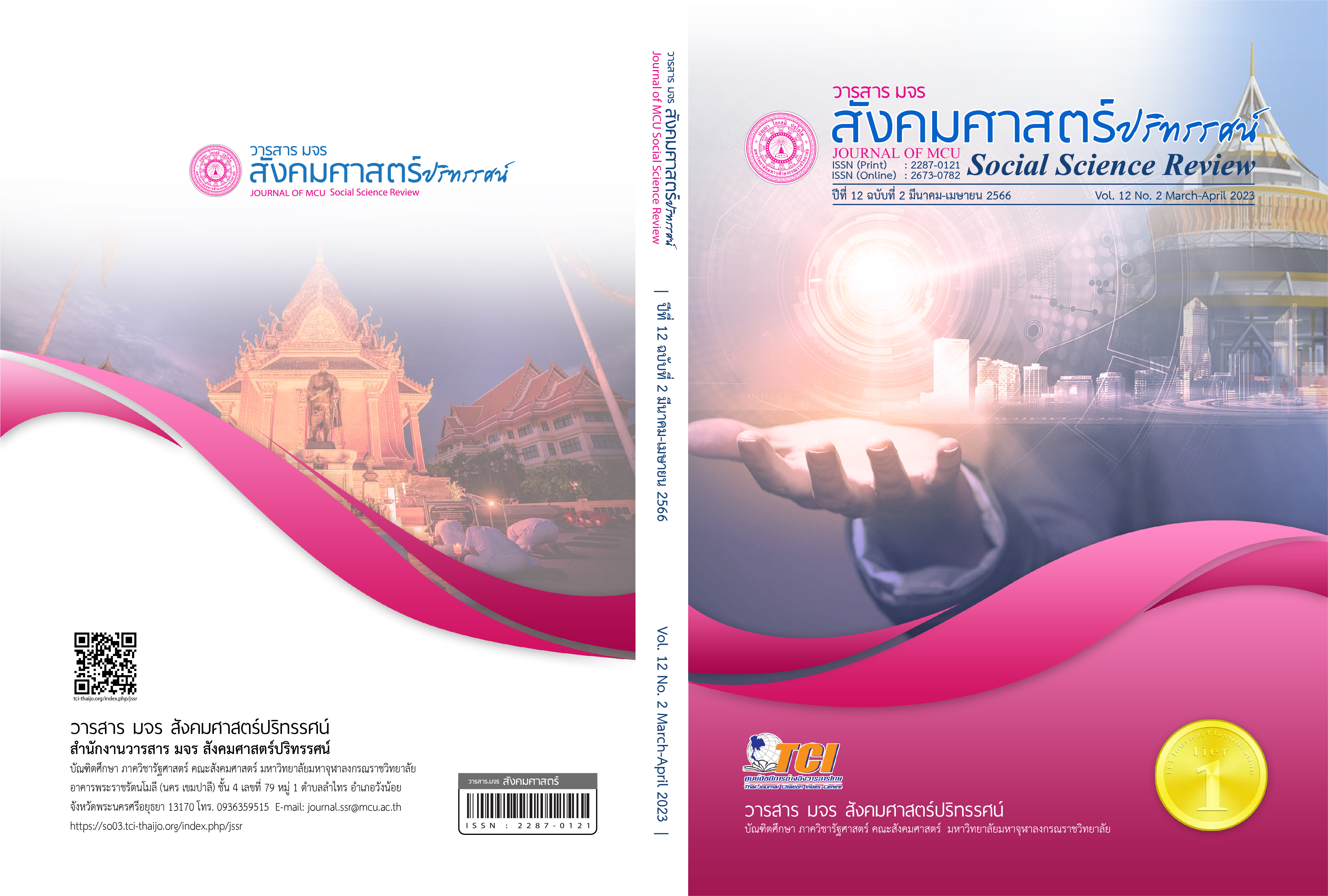การพัฒนาสมรรถนะเชิงพุทธเพื่อการเรียนรู้เทคโนโลยีดิจิทัล ของบุคลากรศาลปกครอง
คำสำคัญ:
การพัฒนาสมรรถนะ, การเรียนรู้เชิงพุทธ, เทคโนโลยีดิจิทัลบทคัดย่อ
บทความวิจัยนี้มีวัตถุประสงค์ เพื่อศึกษาการพัฒนาสมรรถนะเชิงพุทธเพื่อการเรียนรู้เทคโนโลยีดิจิทัลของบุคลากรศาลปกครอง เป็นการวิจัยแบบผสานวิธี การวิจัยเชิงปริมาณโดยแจกแบบสอบถามกับบุคลากรศาลปกครองซึ่งเป็นกลุ่มตัวอย่างจำนวน 338 คน และ การวิจัยเชิงคุณภาพ โดยการสัมภาษณ์เชิงลึก ผู้ให้ข้อมูลสำคัญจำนวน 18 รูปหรือคน
ผลการวิจัยพบว่า 1.ระดับการพัฒนาสมรรถนะเพื่อการเรียนรู้เทคโนโลยีดิจิทัลของบุคลากรศาลปกครอง โดยภาพรวมอยู่ในระดับมาก ( = 3.79 ) เมื่อพิจารณาเป็นรายด้านพบว่า อยู่ในระดับมากทุกด้านตามลำดับค่าเฉลี่ย คือ ด้านคุณสมบัติส่วนตัว(
=4.02) ด้านมโนทัศน์เกี่ยวกับตนเอง (
= 3.86) ด้านแรงจูงใจ (
= 3.86) ด้านความรู้ (
=3.64) และด้านทักษะ(
= 3.59) 2.การพัฒนาสมรรถนะเชิงพุทธเพื่อการเรียนรู้เทคโนโลยีดิจิทัลของบุคลากรศาลปกครอง สามารถนำหลักปัญญา 3 ได้แก่ สุตมยปัญญา (การเรียนรู้) จินตามยปัญญา (การทบทวน) และ ภาวนามยปัญญา (การปฏิบัติ) มาประยุกต์ใช้ในการบริหารงาน โดยเฉพาะหลักปัญญา 3 ด้านภาวนามยปัญญา (การปฏิบัติ) ศาลปกครองจะต้องกำหนดเป็นนโยบายและแนวทางปฏิบัติในการฝึกอบรมบุคลากรศาลปกครองทุกระดับเพื่อให้มีการปฏิบัติอย่างเข้มข้นในทุกหลักสูตร
เอกสารอ้างอิง
ไกรวิน ไชยวรรณ. (2559). การเสริมสร้างประสิทธิภาพการบริหารงานบุคลากรด้านการบิน ด้วยหลักพุทธธรรมของสถาบันการบินพลเรือน (วิทยานิพนธ์ปริญญาปรัชญาดุษฎีบัณฑิต สาขาวิชารัฐประศาสนศาสตร์). พระนครศรีอยุธยา: มหาวิทยาลัยมหาจุฬาลงกรณราชวิทยาลัย.
ธนาชัย ธีรพัฒนวงศ์ และคณะ (2561). ปัญหายุทธศาสตร์เทคโนโลยีดิจิทัลเพื่อการบริหารภาครัฐ. วารสารวไลยอลงกรณ์ปริทัศน์ มนุษยศาสตร์และสังคมศาสตร์, 8(1), 91-102.
พระปลัดระพิน พุทฺธิสาโร. (2564, 30 ธันวาคม). อาจารย์ประจำหลักสูตรบัณฑิตศึกษาสาขาวิชารัฐประศาสนศาสตร์ [บทสัมภาษณ์].
พระพงษ์ศักดิ์ สนฺตมโน (เกษวงศ์รอด). (2561). แรงจูงใจในการปฏิบัติงานของพนักงานเทศบาล เมืองสระแก้ว จังหวัดสระแก้ว (สารนิพนธ์รัฐประศาสนศาสตรมหาบัณฑิต). บัณฑิตวิทยาลัย: มหาวิทยาลัยมหาจุฬาลงกรณราชวิทยาลัย.
พระมหากฤษฎา กิตฺติโสภโณ. (2564, 30 ธันวาคม). อาจารย์ประจำหลักสูตรบัณฑิตศึกษาสาขาวิชารัฐประศาสนศาสตร์ [บทสัมภาษณ์].
พระสมนึก ธีรปญฺโญ (กลับน้อม). (2564). โมเดลความสัมพันธ์เชิงสาเหตุการพัฒนาสมรรถนะต้นแบบข้าราชการองค์กรปกครองส่วนท้องถิ่นในจังหวัดนนทบุรี (วิทยานิพนธ์ปริญญาปรัชญาดุษฎีบัณฑิต สาขาวิชารัฐประศาสนศาสตร์). พระนครศรีอยุธยา: มหาวิทยาลัยมหาจุฬาลงกรณราชวิทยาลัย.
ศาลปกครอง. (2563). แผนแม่บทศาลปกครอง ระยะ 20 ปี พ.ศ. 2560 – 2580. สืบค้น 22 ธันวาคม 2563, จาก: http://admincourt.go.th/admincourt/upload/webcms/Court/Court_310120_1458
ส่วนนโยบายรัฐบาลอิเล็กทรอนิกส์ ฝ่ายนโยบายและยุทธศาสตร์ สำนักงานอิเล็กทรอนิกส์ องค์การมหาชน สรอ. (2560). แผนพัฒนารัฐบาลดิจิทัลของประเทศไทย พ.ศ. 2560 – 2564. กรุงเทพฯ: บริษัท โบลลิเกอร์ แอนด์ คอมพานี ประเทศไทย จำกัด.
สำนักงาน ก.พ.. (2561). ทักษะด้านดิจิทัลของข้าราชการและบุคลากรภาครัฐเพื่อการปรับเปลี่ยนเป็นรัฐบาลดิจิทัล ตาม ว6/2561. สืบค้น 22 ธันวาคม 2563, จาก: https://www.ocsc.go.th/digital_skills2.
ดาวน์โหลด
เผยแพร่แล้ว
รูปแบบการอ้างอิง
ฉบับ
ประเภทบทความ
สัญญาอนุญาต
ลิขสิทธิ์ (c) 2023 วารสาร มจร สังคมศาสตร์ปริทรรศน์

อนุญาตภายใต้เงื่อนไข Creative Commons Attribution-NonCommercial-NoDerivatives 4.0 International License.
เพื่อให้เป็นไปตามกฎหมายลิขสิทธิ์ ผู้นิพนธ์ทุกท่านต้องลงลายมือชื่อในแบบฟอร์มใบมอบลิขสิทธิ์บทความให้แก่วารสารฯ พร้อมกับบทความต้นฉบับที่ได้แก้ไขครั้งสุดท้าย นอกจากนี้ ผู้นิพนธ์ทุกท่านต้องยืนยันว่าบทความต้นฉบับที่ส่งมาตีพิมพ์นั้น ได้ส่งมาตีพิมพ์เฉพาะในวารสาร มจร สังคมศาสตร์ปริทรรศน์ เพียงแห่งเดียวเท่านั้น หากมีการใช้ภาพหรือตารางหรือเนื้อหาอื่นๆ ของผู้นิพนธ์อื่นที่ปรากฏในสิ่งตีพิมพ์อื่นมาแล้ว ผู้นิพนธ์ต้องขออนุญาตเจ้าของลิขสิทธิ์ก่อน พร้อมทั้งแสดงหนังสือที่ได้รับการยินยอมต่อบรรณาธิการ ก่อนที่บทความจะได้รับการตีพิมพ์ หากไม่เป็นไปตามข้อกำหนดเบื้องต้น ทางวารสารจะถอดบทความของท่านออกโดยไม่มีข้อยกเว้นใดๆ ทั้งสิ้น





